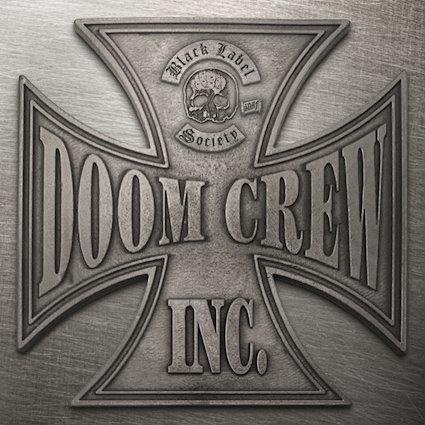Are you the same person you were 30 years ago? Since we all aspire to be eggzakkly like Ozzy guitar renegade Zakk Wylde, the September expanded release of Ozzy Osbourne's 1991 classic "No More Tears" and the new institution of "Doom Crew Inc." by Wylde's Black Label Society provide a priceless opportunity to measure dikks, likks & fakks.
As with AC/DC and Slayer, sticking to a prescribed identity constitutes both a strength and a weakness for Black Label Society: A fan always knows what he's gonna get, but surprise weasels rarely pop. Wylde has been laboring alongside drummer Jeff Fabb for seven years, and bassist John DeServio for way longer -- choices that rank reliability over inspiration. Second guitarist Dario Lorina's main value seems to be his knack for acting as a Zakk double rather than as a foil. Regardless, they slam out a pinbusting groove.
Crucial to avoiding monochromality are add-ons such as the half-speed change on the boogiedown "Destroy & Conquer," the harmonized guitar intro to the chanty waltz "Ruins" and the accelerandos on the Sabbathy plodder "Gospel of Lies."
Wylde recently described the evolution of his guitar style as a process of subtraction -- removing all the classical or bluesy baggage that might recall Yngwie, Jimi or Angus (though he allows himself a "Stairway to Heaven" tribute on the introduction to "Set You Free"). Equally subtractive are his riffs, though it's no accident that the hookiest ones, such as the relentlessly wrathful yet distinct sequence on "End of Days," move around the neck some. Wylde really sets his solo character apart not by his note choices but by his attack, a headlong push slightly ahead of the beat, best heard here on "You Made Me Want To Live" (aggro), "Forsaken" (rippingly passionate) and "Shelter Me" (demonic). He keeps up the intensity while maintaining a remarkably smooth stroke and applying a full palette of sensual tones.
We come to BLS for those guitar solos, and on that level, "Doom Crew Inc." stands as one of the band's most focused. Not to neglect Zakk's gritty voice, which accents this offstage comic's bleak artistic mood as he relates the departure of loved ones, regret that damaged friends refuse spiritual help, disgust at the world. Turns out he's more of an everyman than his biker vest advertises.
* * *
Zakk's Black Label shred requires a different viewpoint than his axwork on "No More Tears." In 1991, having recorded his first album with Ozzy three years before, Wylde was still figuring out how to meld his metallic and countrified proclivities into the more pop-conscious universe of "Tears." But he marked himself as the man for the job, crafting hooky figures to accent the vocals, contributing zonked slide to the title track and "AVM," and kicking up the overall energy level. The last factor shines bright on the valuable demos of six songs (randomly available elsewhere) included on the expanded edition: With Ozzy semi-sober and the inventive Randy Castillo on drums, this was a band ON FIRE. Although the meticulously recorded album versions rock with glossy confidence, the demos leap out of the speakers like wylde animals, Zakk's fiery solo on the hard-charging "Desire" making a special impression. The beautifully orchestrated, mostly acoustic guitars on the outlier instrumental "Mrs. J" (Mrs. John Osbourne?) shimmer with musical intelligence. The reworked and Lemmy-augmented bonus track "Hellraiser" beats heck out of the flabbier album cut. And an intriguing insight arrives via the demo of "Won't Be Coming Home (S.I.N.)" (shadow in the night), whose words of real-life horror, later rewritten, make clear that it's 1982 plane-crash victim Randy Rhoads (first guitarist for the reborn solo artist Ozzy) who "won't be coming home," a phrase not included in either title or lyrics upon original release; Wylde's guitar mourns in true harmony with his boss' pain.
A more apt comparison of Zakk-yesterday-and-today lurks in the 1999 version of the song "No More Tears" added to Black Label Society's debut album, "Sonic Brew." While Ozzy's "Tears" caricatures and almost sympathizes with its predatory narrator, co-writer Wylde's interpretation establishes a soundscape like a jungle tarpit, oozing pure evil; the drums slosh with moral decay; Wylde croaks from the bottom of a well; his nearly out-of-control guitar solo rises to the snapping point of madness. Hey, no kid stays crazy forever. Or at least it's better for all concerned if he doesn't.

